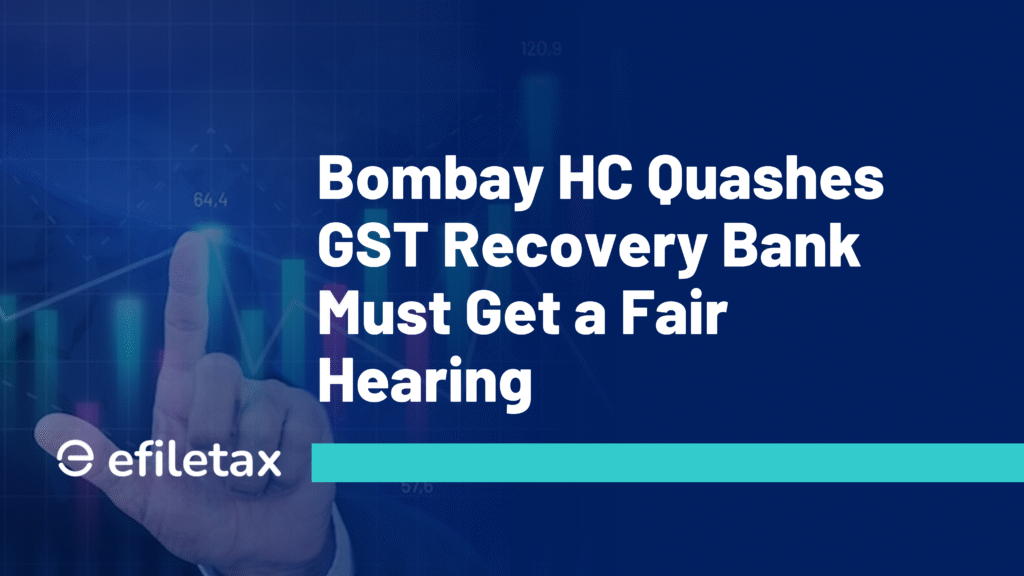
Bombay HC Quashes Recovery Without Hearing: What It Means for You
Focus Keyphrase: Bombay HC recovery notice
The Bombay High Court has once again underscored a critical principle: no recovery without hearing. In a recent judgment, the court quashed a tax recovery notice issued to a bank, stating that such notice must be served on the petitioner, and an opportunity to rebut the liability must be given. This landmark decision is a win for procedural fairness under Indian tax law.
Let’s simplify what happened and why it matters for businesses, banks, and tax professionals.
What Was the Case About?
- The Income Tax Department issued a recovery notice to a bank under Section 226(3) of the Income-tax Act, 1961.
- The notice asked the bank to directly remit funds from the account of a taxpayer, alleging pending dues.
Bombay HC’s Key Observations
The Hon’ble High Court ruled:
- Recovery notices must be served on the assessee (the taxpayer) before coercive action.
- Merely issuing a notice to the bank without notifying the taxpayer violates natural justice.
- The taxpayer has a right to rebut the presumption of liability before funds are attached or recovered.
Legal Backing: Section 226(3) of the Income-tax Act, 1961
- This section empowers the AO to recover tax arrears from third parties (like banks).
Similar rulings include:
| Case | Principle Upheld |
|---|---|
| Kothari Industrial Corporation Ltd. v. Asst. Collector | Recovery without prior notice is invalid |
| Shyam Sunder v. Union of India | Right to be heard is integral even in recovery |
What Should Banks and Taxpayers Do?
For Banks:
- Always seek confirmation from the taxpayer before acting on a 226(3) notice.
- Insist on proper documentation and authority.
For Taxpayers:
- Monitor communications from the department regularly.
- If recovery happens without prior notice, file a writ petition immediately citing violation of natural justice.
Expert Tip: Don’t Ignore Preliminary Notices
In many cases, the department sends pre-recovery communications. Ignoring them is risky.
“Always respond to initial tax notices. Once a 226(3) notice is issued to your bank, reversing the damage becomes complex.”
— Efiletax Tax Litigation Desk
Why This Judgment Matters
- It strengthens taxpayer rights against arbitrary recovery actions.
- Reinforces the duty of the tax department to follow procedure even in recovery cases.
Internal Compliance Tip for CAs and Businesses
✔ Regularly reconcile demand status on the Income Tax portal
✔ Maintain updated correspondence records
✔ Respond using your e-Proceedings tab within time
Final Thoughts
The Bombay HC’s ruling reiterates a simple truth — procedure is not a formality.
At Efiletax, we help businesses stay compliant and defend unjust recovery with expert support.
Need help with recovery notices or tax demands? Talk to Efiletax now — India’s trusted platform for tax filing, appeals, and legal compliance.
FAQs
Q1. What is a recovery notice under Section 226(3)?
It’s a notice issued to a third party (like a bank) to recover tax dues from a taxpayer’s account directly.
Q2. Can I challenge such a notice in court?
Yes, if the department didn’t serve you or allow you to present your side, you can file a writ petition.
Q3. Is the bank liable if it follows the notice?
The bank is protected if it acts in good faith, but it should verify the notice’s legality and inform the account holder.
Q4. Does this apply to GST recovery too?
Similar principles apply under Section 79 of the CGST Act, but specific procedures differ.
Summary
The Bombay HC quashed a tax recovery notice sent to a bank without serving the taxpayer, ruling that Section 226(3) recovery requires prior notice and a chance to rebut liability. This safeguards taxpayers’ rights and reinforces the principle of natural justice.